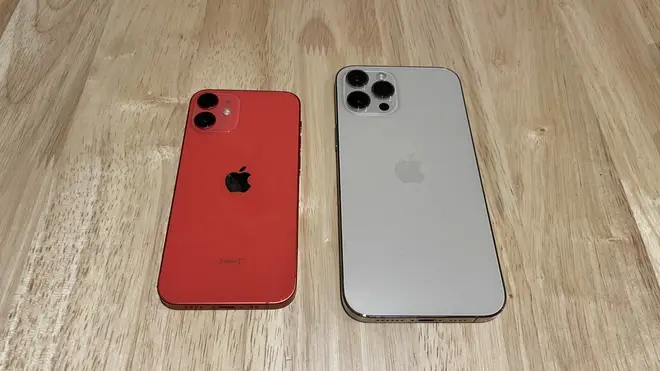
Ian Payne 4am - 7am
27 November 2020, 08:04

The smallest and biggest new models of the 2020 range.
In a bumper year for the iPhone, a wider range of models than ever and the introduction of 5G connectivity are just two ways of luring people in.
Apple’s flagship device is always compelling, but 2020 feels more so because of the range of shapes and sizes the iPhone 12 comes in.
Here is a closer look at the smallest and largest in the new range, the mini and the Pro Max.
– iPhone 12 mini
To look at the iPhone 12 mini is to instantly be reminded of earlier iPhones and a time when smartphones in general were a lot smaller.
This is a good thing because the mini offers specs and performance many times better than those devices, in a size that is incredibly pleasing to interact with.
Those with smaller hands who have loathed the gradual drift towards tablet-sized phones have every right to rejoice because the mini is a compelling argument for why bigger is not always better.

The mini has the same flat-sided design as the rest of the iPhone 12 range, but it works particularly well in this size because it means the phone sits in the hand well and is comfortable to grip.
The 5.4in Super Retina XDR display is bright, with great colour reproduction and detail in photos in particular.
It is not the biggest space to work with if you are used to a bigger screen, but in testing it was still enough to view photos and watch some video.
On the subject of photos, the 12 mini camera does a great job of capturing them with its dual rear-camera system.
It is the same as on the larger iPhone 12, with a wide and ultra-wide lens, and with the updates Apple has made to bring Night Mode to all cameras on the device as well as enhancements such as Deep Fusion, image quality has taken a marked step forward.
Inside the device is Apple’s most powerful chip ever, the A14 Bionic, which has sharpened performance and gaming graphics, which makes this small device feel powerful.
Despite its size, battery life was good throughout testing, when plenty left at the end of each day – not something which has always been true of previous iPhone handsets.
Across the board, the mini has many of the key features and does many of the same things as the other devices in the line-up, but in a smaller package.
This will not appeal to everyone, and in some moments, such as streaming video, the smaller screen will not do the job for all, but to many others, a cutting edge iPhone in this size will be the key selling point.
– iPhone 12 Pro Max
The other end of the iPhone 12 spectrum, is the biggest iPhone by display size that the company has made.
It feels it in the hand – one-handed use isn’t possible for all tasks, such as messaging, so this is not a device for the small-handed.
Like the 12 Pro, the Pro Max has a stainless steel band around its flat edges, while the glass back and screen seem a little less susceptible to fingerprints.
The Super Retina XDR OLED display is really showing off at this size too.

There is nothing that is not enjoyable to do – high-end gaming in landscape orientation, photo-taking and editing, and streaming video are all great, thanks to the large, bright screen and that A14 Bionic chip which speeds everything up.
The Pro Max also houses a triple camera set-up, similar to that on the 12 Pro but boosted by a bigger telephoto lens and a wider range of optical zoom.
Just like across the iPhone range, Night and Portrait Mode have also improved.
Crucially, another key part of the experience that performs well is battery life. Even during heavy usage days, sometimes as much as 50% battery was left by the time it came to plug in overnight, a significant improvement on previous years.
The only sticking point for the 12 Pro Max is the price – starting at £1,099 it is right at the top end of pricing for smartphones in 2020.
But even at that price, those who want the very biggest and best of what Apple and the iPhone can offer should seriously consider this as their next device.